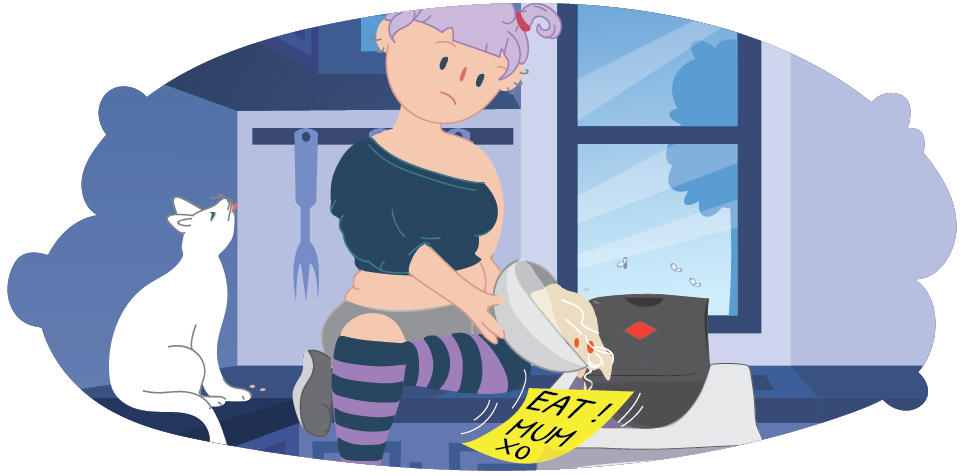How Kids Helpline can help your child
Curious about what Kids Helpline does and how it can help? We’...
READ MEEating disorders are complex and come in many forms. Learn about the most common types and their warning signs.

People with binge eating disorder feel unable to stop themselves from eating and can eat a very large amount of food in a short space of time, even when they feel full.
Here are some signs that someone might have binge eating disorder:
Feeling a lack of control around food or eating
Eating large amounts of food regularly, even when they’re not hungry
Feelings of embarrassment, guilt or disgust about overeating
Sensitive to comments around food, weight or appearance
Feeling extremely upset or anxious after overeating
Eating to the point of feeling uncomfortably full
Being secretive about what they eat and when
Eating alone, in secret or avoiding social events around food
Shoplifting food or spending large amounts of money on food
Hoarding or hiding food and food wrappers around the house
Feelings of embarrassment, guilt or disgust about overeating
Experiencing anxiety, depression, irritability or low self-esteem
Avoiding questions about eating and weight
Continuing to eat even though they feel full
People with anorexia have intense fear of gaining weight and reduce the amount of food they eat, which leads them to being significantly underweight. Some may also binge, purge or exercise excessively.
Here are some signs that someone might have anorexia nervosa:
Limiting food intake, avoiding or skipping meals
Problems with body image or denial of being underweight
Preoccupied with food, body shape, weight or appearance
Counting calories, constant dieting or avoiding food groups
Low self-esteem (guilt, self-criticism, worthlessness)
Rigid thinking (‘black and white’, eg. there are ‘good and bad’ foods)
Saying they’ve eaten when they haven’t or hiding uneaten food
Sensitive to comments about body shape, weight or eating
Vomiting, misusing laxatives or appetite suppressants
Changes in their clothing style or appearance
Avoiding situations involving food or spending more time alone
Rituals around food (cutting into small pieces, eating slowly)
Repetitive body-checking (weighing, looking in the mirror)
Excessive or compulsive exercise, even if injured or sick
Rapid weight loss
Heightened anxiety around meal times
Feeling faint, dizzy, tired or cold all the time
Intense fear of gaining weight
Eating disorders can have a devastating impact on someone’s health. It’s important to seek support for your child as soon as you notice any warning signs.
There is a Parentline service in each state and territory that provides counselling and guidance on any parenting issue. Try calling them for more support and strategies.
Encourage your child to contact Kids Helpline and speak to one of our counsellors for some additional support - they can call us, start a WebChat or email us.
If you are looking for more digital services and resources, check out Head to Health.
How Kids Helpline can help your child
Curious about what Kids Helpline does and how it can help? We’...
READ MEHow Parentline can help you
Parenting can be a tough job but also really rewarding. Talking to ...
READ MEEmpowering young people to ask for help
Being able to ask for help when you need it is an ...
READ MECommunication tips
Young people often tell Kids Helpline they find it difficult to communicate ...
READ METalking helps! We’re here for you.
No problem is too big or too small.
We're here 24 hours a day, 7 days a week